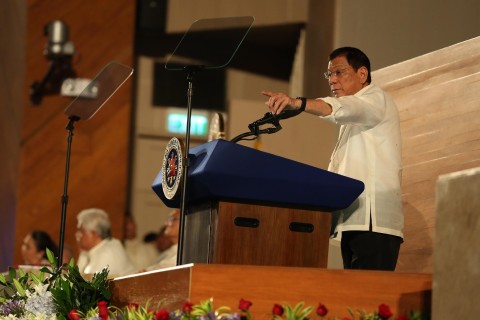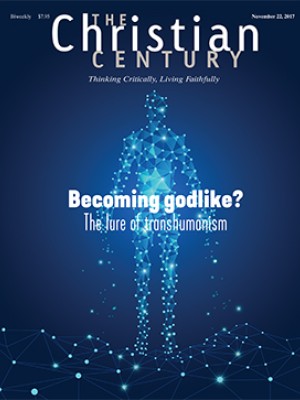Churches in the Philippines decry killings in antidrug crackdown
One of the country’s most powerful institutions, the Roman Catholic Church, is stepping up its criticism of President Duterte's crackdown.

(The Christian Science Monitor) In a church compound in Manila’s far-reaching suburbs, a few dozen parishioners have gathered on a Tuesday afternoon. The men and women sit in plastic chairs and some come forward to share their experiences.
George Alfonso watches intently. The parish priest is supervising the event, a group therapy session for drug users trying to get clean.
Addiction comes with more than the usual risks since President Rodrigo Duterte took office in June 2016, pledging to rid the country of drugs in order to reduce crime. Filipino police say they have killed more than 3,900 “drug personalities” in official operations since Duterte took office, while activists say the actual death toll could be as high as 13,000. They say that vigilantes have killed most of the people allegedly using or selling drugs.
Read our latest issue or browse back issues.
In Duterte’s inaugural State of the Nation address, he estimated there were 3.7 million “drug addicts” in the Philippines, a country of 100 million. “I have to slaughter these idiots who are destroying my country,” he said.
Human rights groups have decried the violence. But month after month, polls have shown high support at home for Duterte’s antidrug campaign, with many Filipinos frustrated by past failures to tackle the problem.
Now public opinion appears to be shifting. And one of the country’s most powerful institutions, the Roman Catholic Church, is saying the crackdown has gone too far.
The influential Catholic Bishops’ Conference of the Philippines decreed that church bells across the country be rung at 8 p.m. for 40 days in September and October to protest the killings.
“For the sake of the children and the poor, stop their systematic murders and spreading reign of terror,” wrote Socrates Villegas, CBCP president, in a statement.
He became more explicit in a homily. “We are losing our national soul to the Father of Lies and Prince of Darkness,” Villegas preached, using traditional names for the devil. “They are killing the poor and poisoning our consciences.”
In a society where 81 percent of the population is Roman Catholic, the church is not known to be a passive bystander in politics. In the 1970s and ’80s, it was a key player in the opposition movement that led to the downfall of dictator Ferdinand Marcos. As the press was muzzled and political repression increased, the clergy helped mobilize the population.
In many parishes, opposition to the antidrug war began quietly. The Baclaran Church in central Manila, for example, has sheltered witnesses of police violence since early this year. It has also exhibited images of police victims to protest the alleged extrajudicial killings.
Activists opposing the carnage have gone from parish to parish in search of cooperation. Benjamin Cordero, an activist for the Stop the Killings movement, said: “We cannot see the whole Catholic Church as one. We have to talk to every church, each diocese, archdiocese. The local parishes, they’re easy to talk to, and they allow us to use their churches as a venue.”
As the war on drugs raged in the slums, the church’s base began to tackle its consequences.
“If you go to the really poor urban communities around Metro Manila where a lot of these killings are happening, you will find it’s the local dioceses that are taking action,” said Carlos Conde, the Philippines researcher for the international advocacy group Human Rights Watch. “They are reaching out to the poorest of the poor; they are reaching out to their flock.”
Parishes like Alfonso’s Santa Quiteria in Caloocan began to run rehabilitation programs together with the local government and the police, seeking to address the country’s drug problem at its roots.
“We don’t have any right to kill a person; instead we should understand the person,” Alfonso said.
Duterte has accused the church of having a sense of “moral ascendency” and has drawn attention to the child abuse scandals that have tainted its reputation here and around the world. The president has said he was abused by a priest as a teenager.
Conde commented: “He knows that this is the Achilles’ heel of the church, and he used it against them. From the moment he stepped into the office, Duterte started firing at the church, putting it on the defensive.”
But as the public mood begins to shift, many among the clergy have found a louder voice.
In August, the police allegedly shot 17-year-old Kian delos Santos in Caloocan, a district of Manila. Police claimed that Kian was armed and resisted arrest. Video at the scene and witness accounts, however, suggested that he was shot in the head and that evidence of resisting was planted near his body. The teenager’s murder sparked an outcry, with protests and a funeral march attended by thousands.
Soon after Kian’s death, Bishop Pablo David sheltered several witnesses to his murder, including one minor, on the grounds of San Roque Cathedral in Caloocan. When the police came to pick up one young man, the bishop refused to hand him over.
[Protestant clergy in the Philippines have also been taking a stand against the violence. The United Methodist General Board of Church and Society released a statement charging Duterte with “virtually licensing the police to shoot-to-kill” without evidence that people were involved in selling drugs. Yet even executing the guilty would not be a solution, they wrote; the government should address the root problems of addiction.
The National Council of Churches in the Philippines noted in a statement that several other teenagers were killed within weeks of Kian’s death, with their deaths believed to have been caused by police or military: “Young people and the poor have become vulnerable to impunity while suspected big-time drug syndicates have their day in court. The slaughter has to stop.”]
On October 12, the president pulled the national police out of the war on drugs, saying the change should satisfy “bleeding hearts and media.” The decision leaves the Philippine Drug Enforcement Agency, which makes up only 1 percent of the police force, to conduct all official operations.
Despite that move, some worry that the church is once again headed toward a prolonged struggle with a head of state. Under Marcos, thousands of people were arrested, tortured, or killed.
“At that time, the church people were really on a collision course with Marcos,” Alfonso said. “Now that may repeat itself.”
FOLLOWING UP (Updated August 21, 2018): In mid-June a third Catholic priest was assassinated in the Philippines and another survived an attempt on his life, Vatican News reported. Richmond Nilo’s death was part of “escalating violence and [a] culture of impunity in the country,” said Sofronio Bancud, a Filipino bishop, in a statement.
In April another priest, Mark Ventura, was talking with congregants after mass when a man wearing a motorcycle helmet shot and killed him and then fled on a motorcycle, according to Vatican News. The 37-year-old priest was known “for his anti-mining advocacies and for helping indigenous peoples” in the region where he ministered, Vatican News reported. Another priest, Marcelito Paez, 72, was gunned down after facilitating the release of a political prisoner in December.
In addition, the government of the Philippines has recently expelled or detained missionaries accused of participating in political activities. Patricia Fox, an Australian Catholic sister, was arrested and had her visa revoked in April after she participated in a human rights fact-finding mission, Vatican News wrote. In her words, she has advocated for farmers “for their rights to land, livelihood, peace, justice, and security.” Filipino officials also refused to allow three United Methodist missionaries to leave the country this spring. They took part in an ecumenical delegation investigating the deaths of nine indigenous people, among other human rights violations. One was arrested in May and placed in a detention center.
The three United Methodist missionaries returned to their homes in Malawi, the U.S., and Zimbabwe, in July. The missionaries, all in their twenties, were “subjected to false accusations and actions by the Republic of the Philippines,” according to the mission agency that campaigned for them. “After six weeks of unsuccessful negotiations with the Filipino government, the media attention and support generated by the campaign had an almost immediate impact,” United Methodist News Service reported.
Versions of this article appear in the print edition under the title “Churches in the Philippines decry vigilante killings in antidrug crackdown” and in the Following up section.






